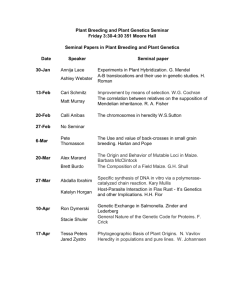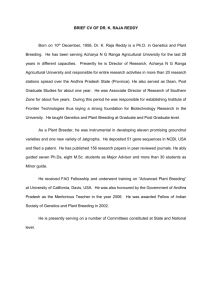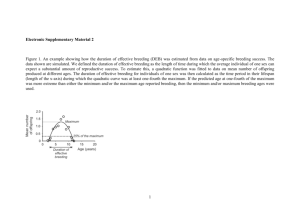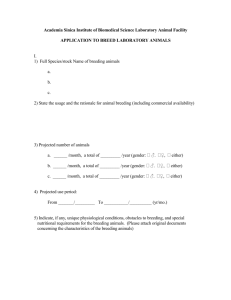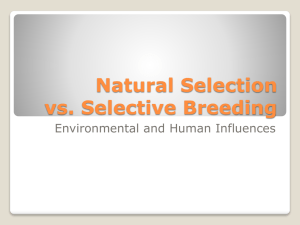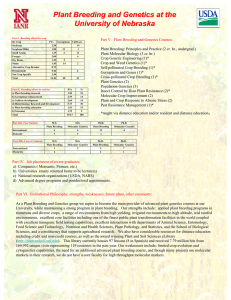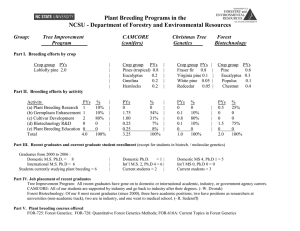Plant Breeding Research at the Louisiana State University Agricultural Center
advertisement
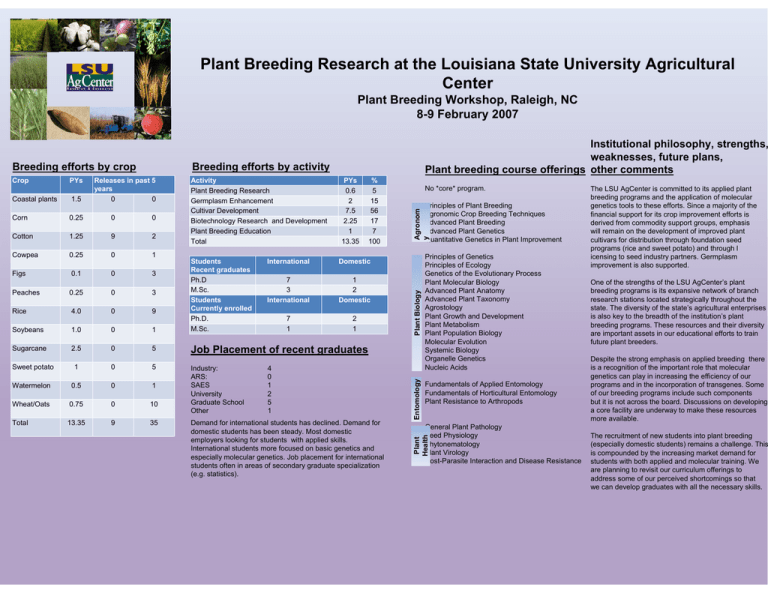
Plant Breeding Research at the Louisiana State University Agricultural Center Plant Breeding Workshop, Raleigh, NC 8-9 February 2007 Institutional philosophy, strengths, weaknesses, future plans, Plant breeding course offerings other comments Coastal plants 1.5 Corn 0.25 0 0 Cotton 1.25 9 2 Activity Plant Breeding Research Germplasm Enhancement Cultivar Development Biotechnology Research and Development Plant Breeding Education Total Cowpea 0.25 0 1 Figs 0.1 0 3 Peaches 0.25 0 3 Rice 4.0 0 9 Soybeans 1.0 0 1 Students Recent graduates Ph.D M.Sc. Students Currently enrolled Ph.D. M.Sc. Sugarcane 2.5 0 5 Job Placement of recent graduates Sweet potato 1 0 5 Watermelon 0.5 0 1 Wheat/Oats 0.75 0 10 Industry: ARS: SAES University Graduate School Other Total 13.35 9 35 Releases in past 5 years Germplasm Cultivars 0 0 PYs 0.6 2 7.5 2.25 1 13.35 % 5 15 56 17 7 100 International Domestic 7 3 International 1 2 Domestic 7 1 2 1 4 0 1 2 5 1 Demand for international students has declined. Demand for domestic students has been steady. Most domestic employers looking for students with applied skills. International students more focused on basic genetics and especially molecular genetics. Job placement for international students often in areas of secondary graduate specialization (e.g. statistics). No *core* program. Principles of Plant Breeding Agronomic Crop Breeding Techniques Advanced Plant Breeding Advanced Plant Genetics Quantitative Genetics in Plant Improvement Agronom y PYs Plant Biology Crop Entomology Breeding efforts by activity Principles of Genetics Principles of Ecology Genetics of the Evolutionary Process Plant Molecular Biology Advanced Plant Anatomy Advanced Plant Taxonomy Agrostology Plant Growth and Development Plant Metabolism Plant Population Biology Molecular Evolution Systemic Biology Organelle Genetics Nucleic Acids Fundamentals of Applied Entomology Fundamentals of Horticultural Entomology Plant Resistance to Arthropods General Plant Pathology Seed Physiology Phytonematology Plant Virology Host-Parasite Interaction and Disease Resistance Plant Health Breeding efforts by crop The LSU AgCenter is committed to its applied plant breeding programs and the application of molecular genetics tools to these efforts. Since a majority of the financial support for its crop improvement efforts is derived from commodity support groups, emphasis will remain on the development of improved plant cultivars for distribution through foundation seed programs (rice and sweet potato) and through l icensing to seed industry partners. Germplasm improvement is also supported. One of the strengths of the LSU AgCenter’s plant breeding programs is its expansive network of branch research stations located strategically throughout the state. The diversity of the state’s agricultural enterprises is also key to the breadth of the institution’s plant breeding programs. These resources and their diversity are important assets in our educational efforts to train future plant breeders. Despite the strong emphasis on applied breeding there is a recognition of the important role that molecular genetics can play in increasing the efficiency of our programs and in the incorporation of transgenes. Some of our breeding programs include such components but it is not across the board. Discussions on developing a core facility are underway to make these resources more available. The recruitment of new students into plant breeding (especially domestic students) remains a challenge. This is compounded by the increasing market demand for students with both applied and molecular training. We are planning to revisit our curriculum offerings to address some of our perceived shortcomings so that we can develop graduates with all the necessary skills.
